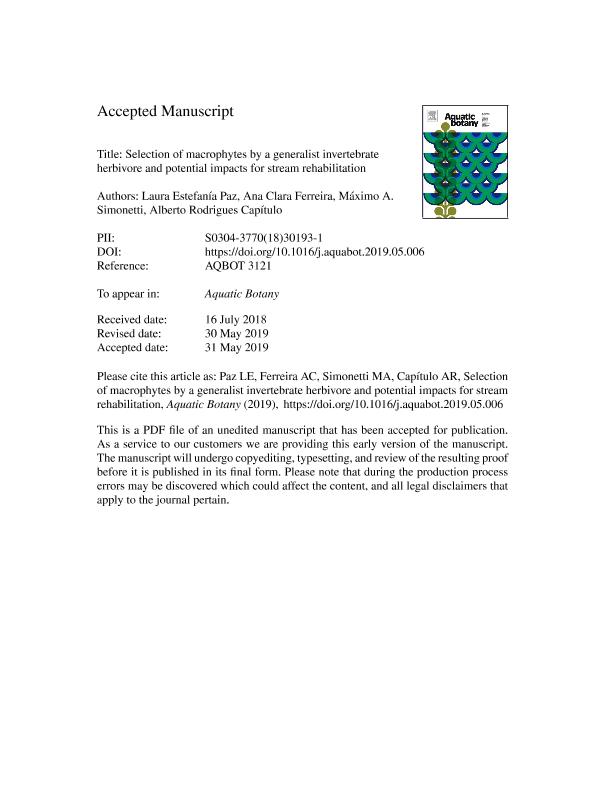Artículo
Selection of macrophytes by a generalist invertebrate herbivore and potential impacts for stream rehabilitation
Fecha de publicación:
10/2019
Editorial:
Elsevier Science
Revista:
Aquatic Botany
ISSN:
0304-3770
Idioma:
Inglés
Tipo de recurso:
Artículo publicado
Clasificación temática:
Resumen
Macrophytes play an important role as resource for herbivores. When they are introduced into streams by, rehabilitation projects herbivores might be attracted to this new food source. Thus, it is important to know the palatability of macrophytes, especially when high densities of herbivores with a high relative consumption rate (RCR) are present. Plant traits influencing herbivory could be an indicator for macrophyte selection in rehabilitation projects. In the laboratory, we assessed the RCR and preference of Pomacea canaliculata for Ludwigia peploides, Gymnocoronis spilanthoides, and Egeria densa, and linked it to plant chemical and structural traits. We also analysed the use of these macrophytes by the snail in plants transplanted into a recently dredged stream. The macrophyte beds transplanted were the only plants present in the stream. Plants and snails were sampled and snail egg masses quantified. In the laboratory, the RCR of E. densa was significantly lower than that of the other species, and the snails did not show any preference among macrophytes. The only trait related to palatability was dry matter content. The abundance of snails in transplanted beds was higher in E. densa and G. spilanthoides, and lower on L. peploides despite its highest coverage. The abundance of egg masses was the highest on G. spilanthoides. This indicates that Pomacea canaliculata exhibited active selection and differential use of transplanted macrophytes. In conclusion, L. peploides would be less affected by a generalist invertebrate herbivore and a suitable option to transplant into stream channels for rehabilitation projects.
Palabras clave:
AQUATIC PLANT
,
POMACEA CANALICULATA
,
PREFERENCE
,
RCR
,
TRANSPLANTATION
Archivos asociados
Licencia
Identificadores
Colecciones
Articulos(ILPLA)
Articulos de INST.DE LIMNOLOGIA "DR. RAUL A. RINGUELET"
Articulos de INST.DE LIMNOLOGIA "DR. RAUL A. RINGUELET"
Citación
Paz, Laura Estefania; Ferreira, Ana Clara; Simonetti, Maximo Andres; Rodrigues Capitulo, Alberto; Selection of macrophytes by a generalist invertebrate herbivore and potential impacts for stream rehabilitation; Elsevier Science; Aquatic Botany; 158; 10-2019; 1-30
Compartir
Altmétricas




